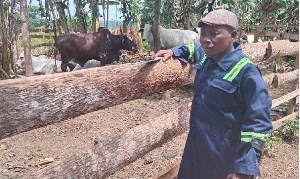Bolgatanga June 21, GNA- Mr. Mark Woyongo, Upper East Regional Minister, at the weekend ob served that the Forestry and Wildlife sector, which contributes immensely to the national budget could be depleted due to improper management.
He said it was worrying that the slow pace of reforestation could not much the destruction of forest reserves by legal and illegal miners and for agricultural purposes.
Mr. Woyongo made the observation when he addressed a stakeholders' consultative workshop in Bolgatanga, organised by the Forestry Commission for the Upper East, Upper West, and Northern regions, to review Forestry and Wildlife laws and policies in the country. He emphasized the importance of forest resource saying, "The sector contributes immensely to our national budget and our foreign exchange earnings and resources through the sale of forest products, traditional and non-traditional and. tourism. It is near impossible to assess all the benefits that Ghana derives from a good forest cover and a variety of wildlife species".
He said there were a lot of global concerns for the protection of the environment, which Ghanaians had to take more seriously in order to protect the existence of future generations.
Science Forest Reserves Depletion 2 Bolgatanga Professor Nii Ashie Kotey, Chief Executive of the Forestry Commission in a speech read on his behalf, explained that government recognized the need for significant reforms in the overall policy and legal regime on forestry, to address existing gaps and inadequacies and respond to emerging issues in the sector relating to good forest governance. He said the Forestry Commission was working with consultants to assess the current laws in the sector in order to identify areas that needed to be reassessed. It would convene a broad range of stakeholders to discuss the policies and laws that regulate the sector and make concrete proposals for the reform of the laws.
He said the stakeholders, drawn from the forestry and wildlife sector, district assemblies, development partners, chiefs and community members in forest fringe communities, were expected to use their expertise and experiences to identify gaps in the laws and make concrete proposals to deal with them.
The Forestry Development Master Plan and the National Forest and Wildlife Policy of 1994 which is being reviewed, contain broad policies for the sustainable management of forest resources.
The objectives of the policies include the management and enhancement of Ghana's permanent estate of forest and wildlife resources, the promotion of viable and efficient forest-based industries, particularly in secondary and tertiary processing and the promotion of public awareness and involvement of rural people in forestry and wildlife conservation. Other objectives are the promotion of research-based and technology led forestry and wildlife management, Utilization and development, and the development of effective capability at national, regional and district levels for sustainable management of forest and wildlife resources. 21 June 09
General News of Sunday, 21 June 2009
Source: GNA












